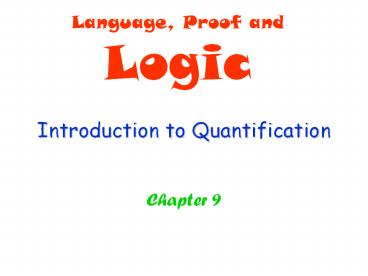Introduction to Quantification - PowerPoint PPT Presentation
Title:
Introduction to Quantification
Description:
Variables --- a new type of basic terms, along with names/constants. ... Fitch understands t,u,v,w,x,y,z with or without subscripts. The quantifier symbols: ... – PowerPoint PPT presentation
Number of Views:60
Avg rating:3.0/5.0
Title: Introduction to Quantification
1
Introduction to Quantification
Language, Proof and Logic
Chapter 9
2
Variables and atomic wffs
9.1
Variables --- a new type of basic terms, along
with names/constants. They
can be seen as placeholders for names Atomic
wffs (well-formed formulas) Home(x),
Taller(max,y),
Tarskis World understands the variables u
through z Fitch understands t,u,v,w,x,y,z with
or without subscripts.
3
The quantifier symbols ?,?
9.2
Universal quantifier ? ?xA(x) is read as for
every x, A(x) for all x, A(x) for every
object x, A(x) etc.
?xHome(x) ?x(Doctor(x)?Smart(x))
Existential quantifier ? ?xA(x) is read
as for some x, A(x) for at least one x,
A(x) there is an object x such that A(x) etc.
?xHome(x) ?x(Doctor(x)?Smart(x))
4
Wffs and sentences
9.3.a
Wff 0. Every atomic wff is a wff 1.
If P is a wff, so is ?P 2. If P1,,Pn
are wffs, so are (P1??Pn) and (P1??Pn)
3. If P and Q are wffs, so are (P?Q) and
(P?Q) 4. If P is a wff and x is a
variable, ?xP and ?xP are wffs
every occurrence of x in these wffs is said to be
bound. As always, external parentheses can be
omitted. An occurrence of a variable that is
not bound is said to be free. In other words, x
is free iff it is not in the scope of ?x or
?x. A sentence is a wff that has no free
occurrences of variables.
5
Wffs and sentences
9.3.b
Is x free or bound in x0 ? (?x(x0)) ?
(?y(x0)) ?y(xy) ?x((x0)?(xy)) (?x(x0))?(x
y)
Is the following wff a sentence ?(01) x0 ?x(
xx) ?x(xy) ?x(x1 ??y(xy1))
6
Semantics for the quantifiers
9.4.a
Consider any wff P(x) that has no free
occurrences of variables other than x. Take
any object, and give it a (new) name c if it does
not already have one. We say that this object
satisfies P(x) iff P(c) is true. When evaluating
quantified sentences, we always have some
nonempty domain of discourse in mind, i.e. the
set of all possible objects in a given
treatment. E.g., in a Tarskis world, this would
be the set of all objects on the board in
arithmetic, this would be the set of all natural
numbers etc. ?xP(x) is true iff there is an
object in the domain that satisfies P(x) ?xP(x)
is true iff every object of the domain satisfies
P(x)
7
Semantics for the quantifiers
9.4.b
?x(xxx) ?x(xxx) ?x(x11) ?x(x11) ?x(xx
x?x) ?x(x?1x) ?x(x?1x) ?x(x0??(xxx)) ?x(
xx1)
When the domain of discourse is 0,1,2,, then
?xP(x) P(0)?P(1)?P(2)? and ?xP(x)
P(0)?P(1)?P(2)?
8
Semantics for the quantifiers
9.4.c
Game rules for ?xP(x) If you commit to the
truth, then your opponent chooses an object
c, and the game continues as if you had committed
to the truth of P(c). If you commit to the
falsity, then you have to choose an object c, and
the game continues as if you had committed to
the falsity of P(c).
Game rules for ?xP(x) If you commit to the
truth, then you have to choose an object c, and
the game continues as if you had committed to
the truth of P(c). If you commit to the
falsity, then your opponent chooses an object c,
and the game continues as if you had committed
to the falsity of P(c).
You try it, page 240 Game World Game Sentences
9
The four Aristotelian forms
9.5
All Ps are Qs Some Ps are Qs No Ps are
Qs Some Ps are not Qs
You try it, page 242
10
Translating complex noun phrases
9.6
Small, Happy, Dog, Home. Translate A small
happy dog is at home (existential noun phrase)
Translate Every small dog that is at home is
happy (universal noun phr.)
?x(xgt15?xlt6) ? Even(x) ?x(x?0?xx)
True or false?
You try it, p. 248 Dodgsons sentences
Peanos world Pierces world































